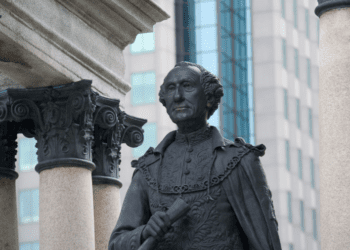[Ed: Speaking to a glittering dinner gathering of delegates to the Charlottetown Conference, this speech is probably best-known for Macdonald’s reflection on the slings and arrows of his pre-Confederation political career: “For twenty long years I have been dragging myself through the dreary waste of Colonial politics. I thought then there was no end, nothing worthy of ambition, but, now I see something which is well worthy of all I have suffered in the cause of my little country.”
Yet the speech also contains important nuances on Macdonald’s supposedly arch-centralist view of the proper balance of power between the federal and provincial governments. Though praising a constitution he claims will form a strong central government, Macdonald also declares that Canada’s new constitution “will preserve for each Province its own identity – and will protect every local ambition; and if we cannot do this we shall not be able to carry out the object we have now in view.”
Macdonald’s remarks are also characteristic of the indispensable politician who delivered Confederation where others had only dreamed. “Everybody admits that Union must take place sometime. I say now is the time… If we allow so favorable an opportunity to pass, it may never come again.”]
Hon. J. A. MACDONALD then rose amid loud cheers, and spoke as follows: My friends and colleagues, Messrs. Cartier and Brown, have returned their thanks on behalf of the Canadians for the kindness bestowed upon us, and I shall therefore not say one word on that subject, but shall approach the question more immediately before us. I must confess to you, sir, and to you, gentlemen, that I approach it with the deepest emotion. The question of “Colonial Union” is one of such magnitude that it dwarfs every other question on this portion of the continent. It absorbs every idea as far as I am concerned.
For twenty long years I have been dragging myself through the dreary waste of Colonial politics. I thought then there was no end, nothing worthy of ambition, but, now I see something which is well worthy of all I have suffered in the cause of my little country. This question has now assumed a position that demands and commands the attention of all the Colonies of British America. There may be obstructions, local difficulties may arise, disputes may occur, local jealousies may intervene, but it matters not – the wheel is now revolving, and we are only the fly on the wheel, we cannot delay it – the union of the colonies of British America, under one sovereign, is a fixed fact. (Cheers.)
Sir, this meeting in Halifax will be ever remembered in the history of British America, for here the delegates from the several provinces had the first opportunity of expressing their sentiments. We have been unable to announce them before, but now let me say that we have arrived unanimously at the opinion that the union of the provinces is for the advantage of all, and that the only question that remains to be settled is, whether that union can be arranged with a due regard to sectional and local interests. I have no doubt can be effected, that every difficulty will be found susceptible of solution that such an arrangement, and that the great project will be successfully and happily realized.
What were we before this question was brought before the public mind? Here we were in the neighborhood of a large nation – of one that has developed its military power in a most marvellous degree – here we were connected by one tie only, that of common allegiance. True it was we were states of one Sovereign, we all paid allegiance to the great central authority, but as far as ourselves were concerned there was no political connection, and we were as wide apart as British America is from Australia. We had only the mere sentiment of a common allegiance, and we were liable, in case England and the United States were pleased to differ, to be cut off, one by one, not having any common means of defence.
I believe we shall have at length an organization that will enable us to be a nation and protect ourselves as we should. Look at the gallant defence that is being made by the Southern Republic – at this moment they have not much more than four millions of men – not much exceeding our own numbers – yet what a brave fight they have made, notwithstanding the stern bravery of the New Englander, or the fierce elan of the Irishman. (Cheers.)
We are now nearly four millions of inhabitants, and in the next decennial period of taking the census, perhaps we shall have eight millions of people, able to defend their country against all comers. (Cheers.) But we must have one common organization – one political government.
It has been said that the United States Government is a failure. I don’t go so far. On the contrary I consider it a marvellous exhibition of human wisdom. It was as perfect as human wisdom could make it, and under it the American States greatly prospered until very recently; but being the work of men it had its defects, and it is for us to take advantage by experience, and endeavor to see if we cannot arrive by careful study at such a plan as will avoid the mistakes of our neighbors.
In the first place we know that every individual state was an individual sovereignty – that each had its own army and navy and political organization – and when they formed themselves into a confederation they only gave the central authority certain specific powers, reserving to the individual states all the other rights appertaining to sovereign powers. The dangers that have risen from this system we will avoid if we can agree upon forming a strong central government – a great central Legislature – a constitution for a Union which will have all the rights of sovereignty except those that are given to the local governments. Then we shall have taken a great step in advance of the American Republic.
If we can only obtain that object – a vigorous general government – we shall not be New Brunswickers, nor Nova Scotians, nor Canadians, but British Americans, under the sway of the British Sovereign. In discussing the question of colonial union, we must consider what is desirable and practicable; we must consult local prejudices and aspirations. It is our desire to do so. I hope that we will be enabled to work out a constitution that will have a strong central Government, able to offer a powerful resistance to any foe whatever, and at the same time will preserve for each Province its own identity – and will protect every local ambition; and if we cannot do this we shall not be able to carry out the object we have now in view.
In the Conference we have had we have been united as one man – there was no difference of feeling – no sectional prejudices or selfishness exhibited by any one; – we all approached the subject feeling its importance; feeling that in our hands were the destinies of a nation; and great would be our sin and shame if any different motives had intervened to prevent us carrying out the noble object of founding a great British Monarchy, in connection with the British Empire, and under the British Queen. (Cheers.)
That there are difficulties in the way would be folly for me to deny; that there are important questions to be settled before the project can be consummated is obvious; but what great subject that has ever attracted the attention of mankind has not been fraught with difficulties? We would not be worthy of the position in which we have been placed by the people if we did not meet and overcome these obstacles.
I will not continue to detain you at this late period of the evening, but will merely say that we are desirous of a union with the Maritime Provinces on a fair and equitable basis: that we desire no advantage of any kind, that we believe the object in view will be as much in favor as against these Maritime Colonies. We are ready to come at once into most intimate connection with you. This cannot be fully procured, I admit, by political union simply.
I don’t hesitate to say that with respect to the Intercolonial Railway, it is understood by the people of Canada that it can only be built as a means of political union for the Colonies. It cannot be denied that the Railway, as a commercial enterprise, would be of comparatively little commercial advantage to the people of Canada. Whilst we have the St. Lawrence in Summer, and the American ports in time of peace, we have all that is requisite for our purposes. We recognize, however, the fact that peace may not always exist, and that we must have some other means of outlet if we do not wish to be cut off from the ocean for some months in the year. We wish to feel greater security – to know that we can have assistance readily in the hour of danger.
In the case of a union, this Railway must be a national work, and Canada will cheerfully contribute to the utmost extent in order to make that important link without which no political connection can be complete. What will be the consequence to this city, prosperous as it is, from that communication? Montreal is at this moment competing with New York for the trade of the great West. Build the road and Halifax will soon become one of the great emporiums of the world. All the great resources of the West will come over the immense railways of Canada to the bosom of your harbor. But there are even greater advantages for us all in view. We will become a great nation, and God forbid that it should be one separate from the United Kingdom of Great Britain and Ireland. (Cheers.)
There has been a feeling that because the old colonies were lost by the misrule of the British Government, every colony must be lost when it assumes the reins of self-government. I believe, however, as stated by the gallant Admiral, that England will hold her position in every colony – she will not enforce an unwilling obedience by her arms; but as long as British Americans shall retain that same allegiance which they feel now, England will spend her last shilling, and spill her best blood like wine in their defence. (Cheers.)
In 1812 there was an American war because England empressed American seamen. Canadians had nothing to do with the cause of the quarrel, yet their militia came out bravely and did all they could for the cause of England. Again, we have had the Oregon question, the Trent difficulty, question after question in which the Colonies had no interest, yet we were ready to shoulder the musket and fight for the honor of the mother country. It has been said that England wishes to throw us off. There may be a few doctrinaires who argue for it, but it is not the feeling of the people of England. Their feeling is this – that we have not been true to ourselves, that we have not put ourselves in an attitude of defence, that we have not done in Canada as the English have done at home. It is a mistake: Canada is ready to do her part. She is organizing a militia, she is expending an enormous amount of money for the purpose of doing her best for self-protection.
I am happy to know that the militia of Nova Scotia occupies a front rank; I understand by a judicious administration you have formed here a large and efficient volunteer and militia organization. We are following your example and are forming an effective body of militia, so that we shall be able to say to England, that if she should send her arms to our rescue, at a time of peril, she would be assisted by a well disciplined body of men.
Everything, gentlemen, is to be gained by Union, and everything to be lost by disunion. Everybody admits that Union must take place sometime. I say now is the time. Here we are now in a state of peace and prosperity now we can sit down without any danger threatening us, and consider and frame a scheme advantageous to each of these colonies. If we allow so favorable an opportunity to pass, it may never come again; but I believe we have arrived at such a conclusion in our deliberations that I may state without any breach of confidence that we all unitedly agree that such a measure is a matter of the first necessity, and that only a few (imaginary I believe) obstacles stand in the way of its consummation.
I will feel that I shall not have served in public life without a reward, if before I enter into private life I am a subject of a great British American nation, under the government of Her Majesty, and in connection with the Empire of Great Britain and Ireland. (Loud cheers.)




